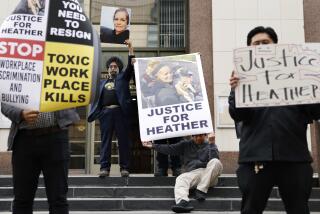A Pinched Iraq Yells ‘Ouch’
- Share via
United Nations weapons inspectors in Iraq continue to broaden their hunt for chemical, biological and nuclear weapons. The inspectors are being properly aggressive, precisely enforcing a Security Council mandate. Iraq’s protests against them are hollow and can only mean the inspectors are being effective. What Iraq’s elites should be worrying about is not what inspectors are doing but what comes next.
Iraqi officials reported that U.N. teams searched 16 sites Sunday. That was the largest number viewed since inspections began Nov. 27 after a halt of nearly four years. One location was the Iraqi National Monitoring Directorate, a government research complex, where inspectors refused to let anyone enter or leave during the six hours of scrutiny. Iraq’s U.N. ambassador was at the directorate and termed the lockdown “unacceptable behavior.”
He had it backward. What was unacceptable was Iraq’s response to U.N. inspections in the 1990s. Then, while inspectors came in the front door, Iraqis too often hauled great quantities of material out the back door. The U.N. did not order those inspections on a lark; they were a response to Iraq’s 1990 invasion of Kuwait and its defeat in the 1991 Gulf War. As time went by, the support of U.N. member nations faded and Iraq was able to get away with obstructive behavior.
In November, the Security Council unanimously voted to resume the hunt for weapons of mass destruction in Iraq -- specifically, chemical, biological and nuclear weapons, as well as long-range missiles -- and gave Baghdad a “final opportunity” to disarm. Although inspectors report few difficulties in visiting sites, Iraq has been less than candid in telling the U.N. what weapons and chemicals it possesses.
The man in charge of the hunt for biological and chemical weapons, Sweden’s Hans Blix, and his counterpart in the search for nuclear weapons, Mohamed ElBaradei of the International Atomic Energy Agency, said the 12,000-page declaration Iraq submitted Dec. 7 was full of holes and padded with worthless information. Washington was more specific, charging that Iraq did not admit trying to procure uranium from Niger or account for botulinum toxin it was known to have obtained. Rather than update the declaration, Saddam Hussein on Monday claimed inspectors were spying on military facilities. His recalcitrance gives ammunition to hawks wanting a war to oust him.
Blix and ElBaradei are due to report to the Security Council about the inspections Jan. 27. Hussein is unlikely to satisfy the two men before then. At that point the council will decide whether to authorize military action, knowing the Bush administration may decide to form its own coalition against Iraq.
Arab nations could aid Iraq best by urging Hussein to step down or, failing that, by encouraging high-ranking Iraqis to force him into exile before he pulls Iraq into war.
More to Read
Sign up for Essential California
The most important California stories and recommendations in your inbox every morning.
You may occasionally receive promotional content from the Los Angeles Times.













